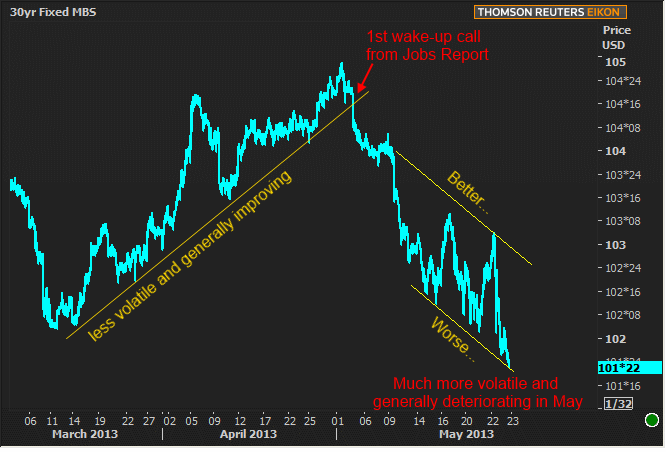So you've done all your research, called at least three different lenders to get their mortgage interest rates and costs, and you've made the decision to pick the one that will give you the best rate, at the lowest costs, with the least hassle -- no small feat these days.
There's one more decision to make, and it's a big one: Should you lock in your rate?
Many customers, especially first time home-buyers, are surprised to learn that interest rates can change minute by minute, hour by hour, day by day. They may assume that the rate they are quoted is guaranteed. Just like the price of a stock constantly changes until you make the decision to buy it, mortgage interest rates always move with the markets.
The only way to "buy" an interest rate and the costs that go along with it is to request a lock-in, which will guarantee a certain interest rate for a limited period of time. As always in the real-estate industry, it's important that you get something in writing verifying how long that rate and price are guaranteed for (it will be 30 to 60 days for a normal purchase or refinance).
Since May 2013, we have seen some volatile trading in the markets that most directly affect mortgage lending rates: the MBS and the Treasury Bond market. That has translated to single-day movements of as much as 1%. The graph below from Mortgage News Daily shows this volatility.

If you called for a rate and price quote around the beginning of May 2013, and you didn't lock your $200,000 loan by the end of that month, then the overall cost of that rate went up by about $2,000.
So what should you do to make sure your rate, or the costs that go along with it, don't go up? It's simple: Lock in the rate.
If rates drop after you've locked yours in, do you get the new, lower rate? Well, think of it this way: If you buy a stock and it plunges in value the very next day, do you get to ask for a refund so you can repurchase those shares at their reduced price?
The answer, clearly, is no. You made the call based on your best research, and the purchase is final. The same is true of locking in a loan.
If you allow the rate to float -- i.e., to fluctuate with the market -- it may come down if interest rates decline, but once you commit to locking, that's the rate you should expect at closing. Locking a rate in is the only way to guarantee you won't pay more if the market moves.
Floating your interest rate may not cost you that much if things go bad. Most daily rate movements won't translate to more than 0.25% in cost on your rate, so on that same $200,000 loan, that gamble is not likely to hit your wallet for more than $500. However, floating your interest rate presents other potential problems.
For one, if you're buying a house, you have a contract closing date that can't be moved simply because you're holding out for the lowest possible rate or you got stuck with a higher rate while playing "mortgage interest rate roulette."
And there's another big risk in floating your rate while house hunting: A sudden spike in rates could turn an approval into a denial if the payment rises enough to push your debt-to-income ratio -- i.e., your monthly debt payments divided by your gross monthly income -- past 43%. With the newest round of regulatory reform imposing much more strict tests of your ability to repay, gambling on a rate has more consequences than it used to. And this past year, mortgage rates have always spiked faster than they've dropped.
If you're refinancing, once you hit your cost-benefit target, lock it in. Refinance markets are much more sensitive to sudden spikes than purchase markets. Usually the only reason you're applying for a refinance mortgage is to get the lower rate. Once they rise, there's really no benefit to making the application. When you see news that rates are at all-time lows, beware: The news tends to lag the current available rates by a week or two. By the time you jump into the process, things could well be on the verge of changing.
It's not a bad idea to ask the mortgage professional you're working with if they have a strategy for locking in your loan. Even more important, if you have requested that your loan be locked in, be sure to ask when you'll receive your rate lock letter and final cost estimate, which gives you the date your lock expires. If you don't get it in writing, then you don't have anything binding to guarantee that the price and rate were in fact locked in. It is common practice now for a customer to receive a lock letter that confirms the interest rate, the costs, and the expiration date of that lock-in.
Make sure you get all necessary paperwork to your loan officer long before that expiration date; it costs money to extend a lock, and that cost is usually paid by you if documents aren't coming in fast enough to finish up the loan.
Like any other financial decision, locking involves deciding how much risk you are willing to take about the direction of rates. If you like playing the odds at the roulette wheel, then keep your rate in a floating (unlocked) status. If you're the type who prefers to watch the game and enjoy the free drinks, then you should lock in your interest rate.






